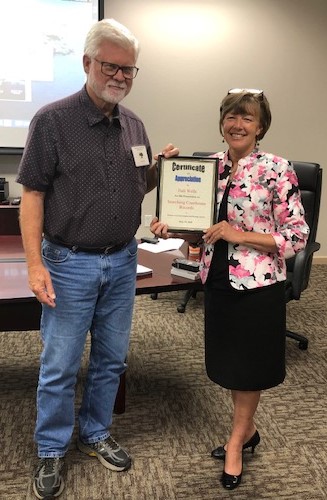In the age of the internet, genealogical research is much easier than it used to be. Birth, death, marriage, military service, and census records frequently can be found online. But not always. Research roadblocks sometimes happen and in Texas, that often requires a visit to the County Clerk's Office. Nacogdoches attorney Judy Wells specializes in establishing the ownership of mineral rights in Texas and is familiar with the process. She shared some useful tips on doing research at a County Clerk's office with the Timpson Area Genealogical and Heritage Society at their July meeting last Wednesday.
“Once when I was searching the records in a County Clerk's office I found the volume I was looking for high on the top of a bookshelf. So I climbed up the ladder and pulled the book off the shelf, sending a cloud of dust into my face, which gave me respiratory problems for about two weeks,” Wells related. Genealogical research has physical hazards as well as emotional ones, so be prepared.
In Texas, the County Clerk is the clerk for the county courts, and the Commisioner's Court, as well as the recorder of all real property instruments in the county. They are responsible for county elections, maintaining vital statistics, issuing marriage licenses, and filing assumed name certificates. They can also administer oaths and affirmations, and take affidavits and depositions. Among the other documents County Clerks record are will probate decrees, adoptions, powers of attorney, prenuptial agreements, abstracts of judgment, patents, and homestead liens, any one of which might be of great value to a genealogical researcher. Finding them might be a different story, Wells shared.
“Why is it so hard to search old county records”? asked Wells. “Because in the old days, the County Clerk was charged with keeping these records but they could use any filing system they chose,” she replied. “Sometimes the clerk kept a separate book for each type of record, so that oil and gas records might be in one book, deeds of trust in another, and foreclosure records in another. The county might have fifteen different books of records. There is also the possibility that someone in the clerk's office became confused and recorded the instrument in the wrong book,” she revealed. “Most County Clerk's Office records are like a maze. Usually there is an index. Start there. Knowing what you are looking for is in Volume 12 is good but there might be several Volume 12s. What are you going to do? You have to ask for help. How do you get someone to help you? Bribe them with treats!” she laughed. “ Cookies and pizza are good choices. So are popcorn and kolaches. I like to take some of my home-made jalapeno salsa and chips” she said. “You have to charm them.”
Sometimes the researcher encounters a roadblock at the courthouse itself. The statement “Oh, that was before the courthouse burned and we lost all the records” can bring tears to a researcher's eyes. “Most of the courthouses in East Texas have burned at least once. Some have burned several times. Shelby County's courthouse burned on June 1, 1882,” Wells shared.
The Timpson Area Genealogical and Heritage Society meets at 2PM on the third Wednesday of each month in the Meeting Room of the Timpson Public Library, located on the corner of Austin and Bremond Streets in Timpson. The public is invited. The TAGHS Genealogy Library is located inside the Timpson Public Library but is currently closed due to Covid-19.

.jpg)



 Click For Louisiana
Click For Louisiana
